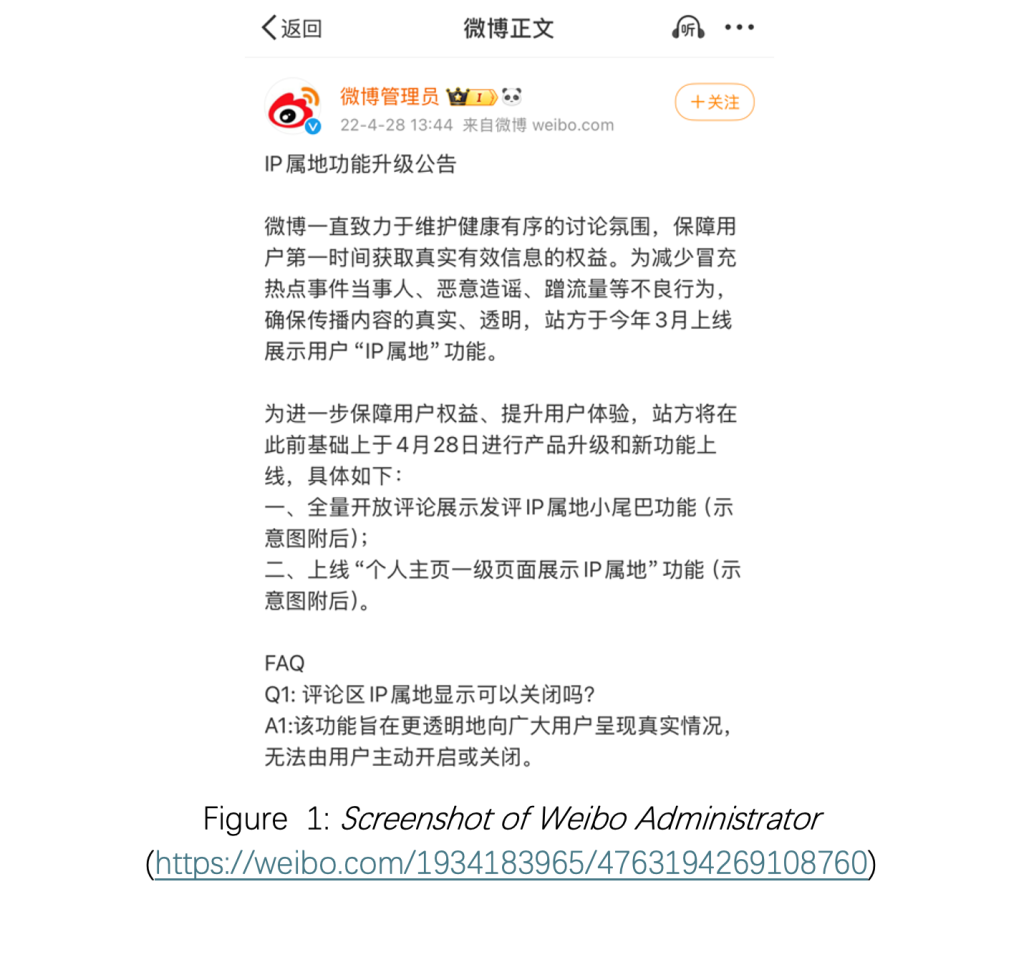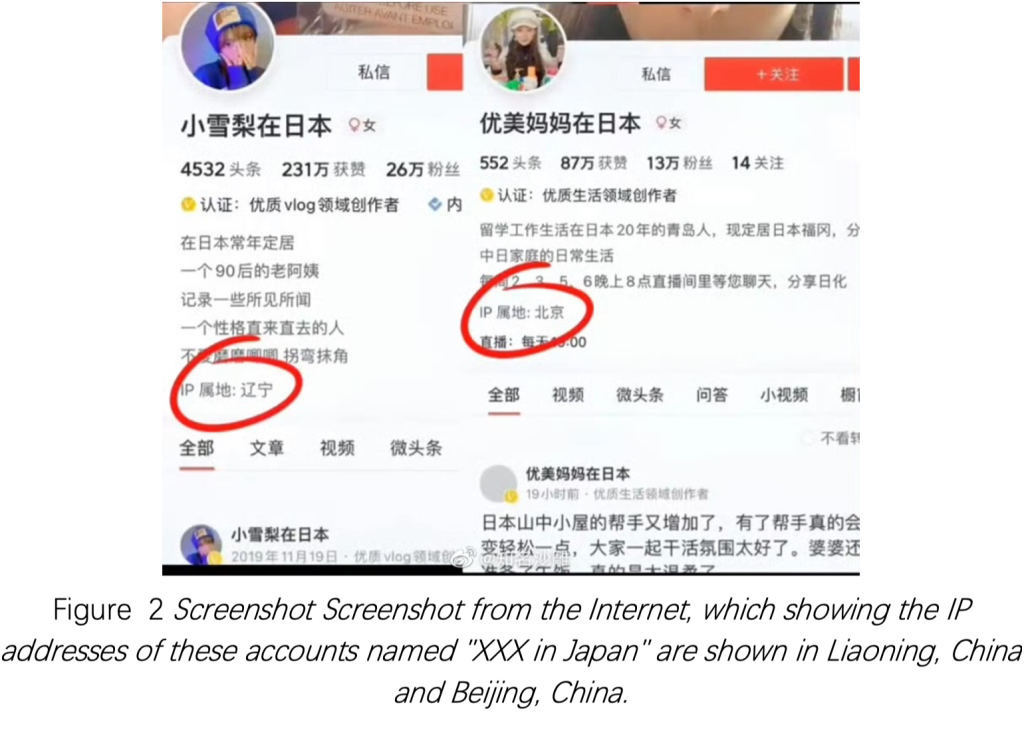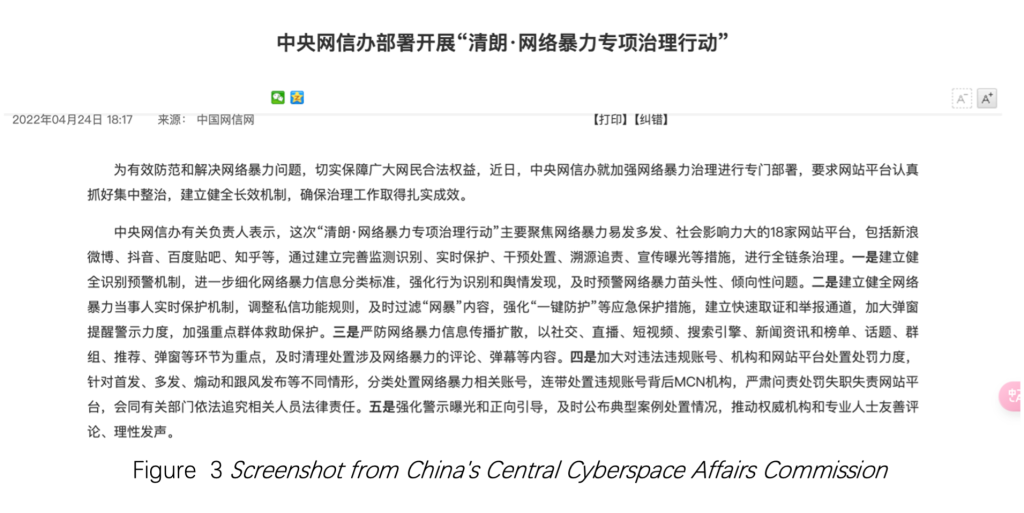
The game between platform rules and user privacy from the perspective of IP location disclosure
Introduction:
Can you imagine that when you speak freely on social media platforms, your IP location will be displayed under your username at the same time? In 2022, China’s social media platforms, including Weibo, Xiaohongshu (RedNote), Douyin (TikTok), Zhihu, etc. have successively launched the IP location display function.
When users post content and comments, the IP location will be displayed, and it cannot be turned off. In other words, your every move on the Internet will be accompanied by a fixed label of your geographic location. The emergence of this behaviour has caused widespread controversy among people. Today, you can still find many users expressing their disgust with this measure on platforms like Weibo, saying that they “I hate to publish IPs.”

As shown in Figure 1, Weibo Administrator, one of the official accounts of Weibo posted that this action was to maintain the network environment and protect the rights of users to obtain real and valid information. It also states that this feature is mandatory, and users cannot choose to turn it off or on.
Some users questioned whether this violated personal rights, but some users supported it and believed that this method was only disclosing the province/region, not to the specific address of the individual, so it did not violate privacy, and it helped with reducing internet violence and topics instigating by foreign forces.
Is this an effective way to govern Internet chaos as Weibo said, or is it an infringement on user privacy? If this measure is used in Internet governance in other countries, would you be worried about it?
Privacy vs. Regulation?
Examples of cyberstalking and cyberbullying are common, and Deepfake Harassment also troubles many users, making them afraid to post photos on the Internet. These kinds of issues make us wonder, in the context of such rapid and convenient flow and acquisition of online information, do we really have privacy on social media? And how can we protect ourselves?
In 2022, Chinese social media began to disclose the IP addresses of users, on the grounds that it could reduce rumours, curb online trolls and cyber violence, as well as improve the accuracy and transparency of online information.
In 2025, this policy is still in effect, and the controversy it has caused has never stopped. Because this concerns the rights and freedoms of every Internet users.
This action leads to a core question:
Who has the power to determine the boundaries of privacy on social media platforms?
From the government’s perspective, the government will use social platforms for supervision.
On the one hand, the government monitors public opinion through social platforms. On the other hand, it drives the technology companies behind the platform to supervise and control public opinion and user behavior by issuing policies, laws and regulations (Flew, 2021). However, the government will not directly introduce law to dictate what companies should do, which gives different companies flexibility, but also raises concerns about the transparency of the platform system.
Whether it is government-driven or corporate rule-making, the audience is placed in a weak and passive position. In this change of IP disclosure, the accounts of government and official media organizations will not display the IP location, but users have no rights to decide at all. If they do not want it to be disclosed, they can only choose to leave this social media platform.
Is this a violation of privacy rights, or is it within a reasonable range to maintain the Internet environment and protect data sovereignty through more stringent platform governance measures?
The right to privacy is one of the most important human rights, which is related to personal safety, freedom of speech, freedom of religious belief and many other aspects. Therefore, Article 12 of the Universal Declaration of Human Rights (1948) stipulates that no one shall infringe on the privacy rights of others.
However, as Helen (2010) said, “privacy is a messy and complex subject”. Especially in the platform context, its boundary definition is more complicated and difficult.
Different countries and regions have different regulations on data protection. The European Union regards data protection as a basic right and has also issued the General Data Protection Regulation (GDPR), which provides more comprehensive legal provisions for personal data security and privacy protection.
Policy analysis of public IP addresses on Chinese social media platforms

“What? The IP address of the Japanese living blogger I follow is from Beijing? Are the products he sells fake?” “My favorite actress is clearly attending an event abroad, so why is his Weibo IP listed as domestic? Doesn’t he post his own posts?”
After Chinese social media platforms gradually disclosed IP locations, people found that some accounts that produced overseas life content had IP addresses in China, so they would question whether the content was scripted and edited by MCN companies, which made people doubt the authenticity of their videos. Some accounts that have been used to manipulate public opinion with ulterior motives in hot news events at home and abroad have also surfaced.
This new feature seems to have solved a lot of problems and is indeed helpful in maintaining the Internet environment. However, it has also raised questions about whether privacy has been leaked. The passivity of not being able to choose whether to disclose IP addresses or not has also caused some users to express dissatisfaction and concerns about security.

The fact that major platforms have begun to display IP locations is not a sudden move. It is driven by the government. In fact, since April 2022, China’s Central Cyberspace Affairs Commission has launched a special campaign to combat online violence, establishing regulatory measures and handling mechanisms for 18 influential platforms (Figure 3).
Driven by policies, and because platform governance itself is an important part of platform management and development, major platforms have actively taken measures to respond, thus facilitating the implementation of the IP location disclosure function (Gorwa, 2019).
So how do the various platforms implement this measure? In the process of implementation, will they infringe on the interests of users to give priority to government needs and facilitate platform management?
After the launch of this feature on most platforms, the user’s personal homepage, posting, and commenting will display the IP address of them. Users in China will be displayed to the province (region, city), and those outside China will be displayed to the country.

Different platforms have different regulations regarding government accounts and official media. For example, Xinhuanet, a comprehensive news information service portal sponsored by China’s national news agency Xinhua News Agency, does not display its IP address on Weibo and Douyin platforms, but be displayed on Xiaohongshu.
According to the platform’s official statement, the purpose of this move is to solve the problems of rampant false information, malicious rumors, deliberate manipulation, cyber violence, etc. But have these problems really been solved because of IP disclosure? Or have they brought new problems?
In fact, this feature has caused social controversy since its appearance, and it is still being discussed today.

The main discussion is about privacy. In fact, the IP location is equivalent to the location of the sending device. This information has always existed in the equipment on the operator’s network side and is easy to extract. The act of displaying it on the social networking platform puts this fact in front of everyone, making users realize that the platform operators have always had information about user locations, and they may be easy to be illegally used.
At the same time, users will also question whether this behavior complies with the premise of “informed consent”, because although each platform does issue an announcement to inform users of the changes, it seems that there is no room for choice for users. Users cannot choose whether to disclose the IP location but can only choose whether to continue using this social media platform.
Controversy and Impact Analysis
The move by Chinese social platforms to disclose the location of user IP addresses has caused widespread controversy.
On the one hand, supporters of the policy believe that this move is conducive to combating false information and further cracking down on the behavior of fake information transfer and rumor spreading, just like a popular saying on the Chinese Internet — “The Internet is not a lawless place.” IP disclosure reduces anonymity, increases responsibility, and enhances the deterrent effect of laws and regulations.
In the early stage, it was obvious that many problematic accounts were exposed. For example, the IP addresses of those purchasing agents who sold fakes were not where they claimed, thus reducing the possibility of being deceived.
On the other hand, some users are worried that this practice infringes on privacy and anonymous expression. Many users directly expressed their dissatisfaction with this move.

This Weibo post published in February 2025 stated that publicizing IP is an act of human rights violation, and it is scary that this function is accepted and used. This Weibo post was forwarded 192 times, proving that in the fourth year after the launch of this feature, many netizens still expressed discomfort and protested it.
However, such actions of the platform are driven by the government and are not prohibited by relevant departments, which also proves that this is a legal behaviour under Chinese law. Or in other words, Chinese law has not yet clearly defined this.
The disclosure of IP addresses has indeed brought some changes to public opinion. Exposing the IP location in the foreground provides convenience for local Internet police, who can effectively locate users who post harmful speech or illegal information on the Internet. As a result, such information is reduced, and the public opinion environment is indeed clearer.
At the same time, the disclosure of IP addresses has caused a significant increase in hate speech such as regional attacks. For example, “your words and deeds fit my stereotype of your place”, which has contributed to the occurrence of cyber violence. Some users who are abroad, such as international students and overseas workers, dare not comment on some social issues as well, because they can easily be labelled as foreign forces.
It can be said that this function has restricted the freedom of speech of users to a certain extent and has also affected the diversity of thoughts and voices online. In addition, it has even derived a grey industry of paid IP agents, creating more opportunities for criminals to take advantage of. Unfortunately, from a user’s perspective, there is no way to change this situation except to protest.
Behind these problems, there is a deeper governance logic:
who makes the rules on social platforms?
Suzor (2019) pointed out that social media platforms belong to the companies that created them, and the terms of service agreements of major platforms stipulate that you have the right to terminate your access to the platform. However, once you decide to use them, you must accept any rules set by the platform.
The rules are jointly formulated by the platform and the government, and are not neutral, it constantly changing according to management needs, technology development, policies, etc.
IP disclosure is a typical example of platform governance. The government makes requirements for guidance, and the platform cooperates to issue relevant regulations while maintaining its own interests. And the users? Just being compressed and restricted.
Conclusion and Future Outlook
The IP disclosure of Chinese social media platforms shows that in this case, the core issue is how to find a balance between privacy rights and supervision.
To solve this problem, we first need to clarify the boundaries of online privacy rights in terms of law. We can refer to the laws and policies issued by other countries and regions, such as the EU’s GDPR, to promote more transparent privacy policies and more clear Internet management regulations.
Besides, platforms need to think about giving users more control and not infringe on user rights by relying on their monopoly position.
In fact, after taking this measure in 2022, Chinese social media platforms have subsequently extended some related policies, such as the requirement in 2023 that account operators with a certain number of followers need to display their real names at the homepage, which has sparked heated discussions. Compared with IP disclosure, not all users are targeted this time, but the information exposed is more closely related to privacy rights.
Will this measure become more and more severe, and will it be used as a reference by other countries due to its effectiveness? How can our privacy rights be protected? These are some issues worthy of attention in the future.
Reference list
Flew, T. (2021). Regulating platforms. Polity Press.
Gorwa, R. (2019). What is platform governance? Information, Communication & Society, 22(6), 854–871. https://doi.org/10.1080/1369118X.2019.1573914
Suzor, N. P. (2019). Who Makes the Rules? In Lawless: The Secret Rules That Govern our Digital Lives (pp. 10–24). chapter, Cambridge: Cambridge University Press.
The Paper. (2022, May 30). User IP location display function extended to comment section, platform says it aims to reduce impersonation and rumors. The Paper. https://www.thepaper.cn/newsDetail_forward_18094070
United Nations. (1948). Universal Declaration of Human Rights. https://www.un.org/en/universal-declaration-human-rights/

Be the first to comment